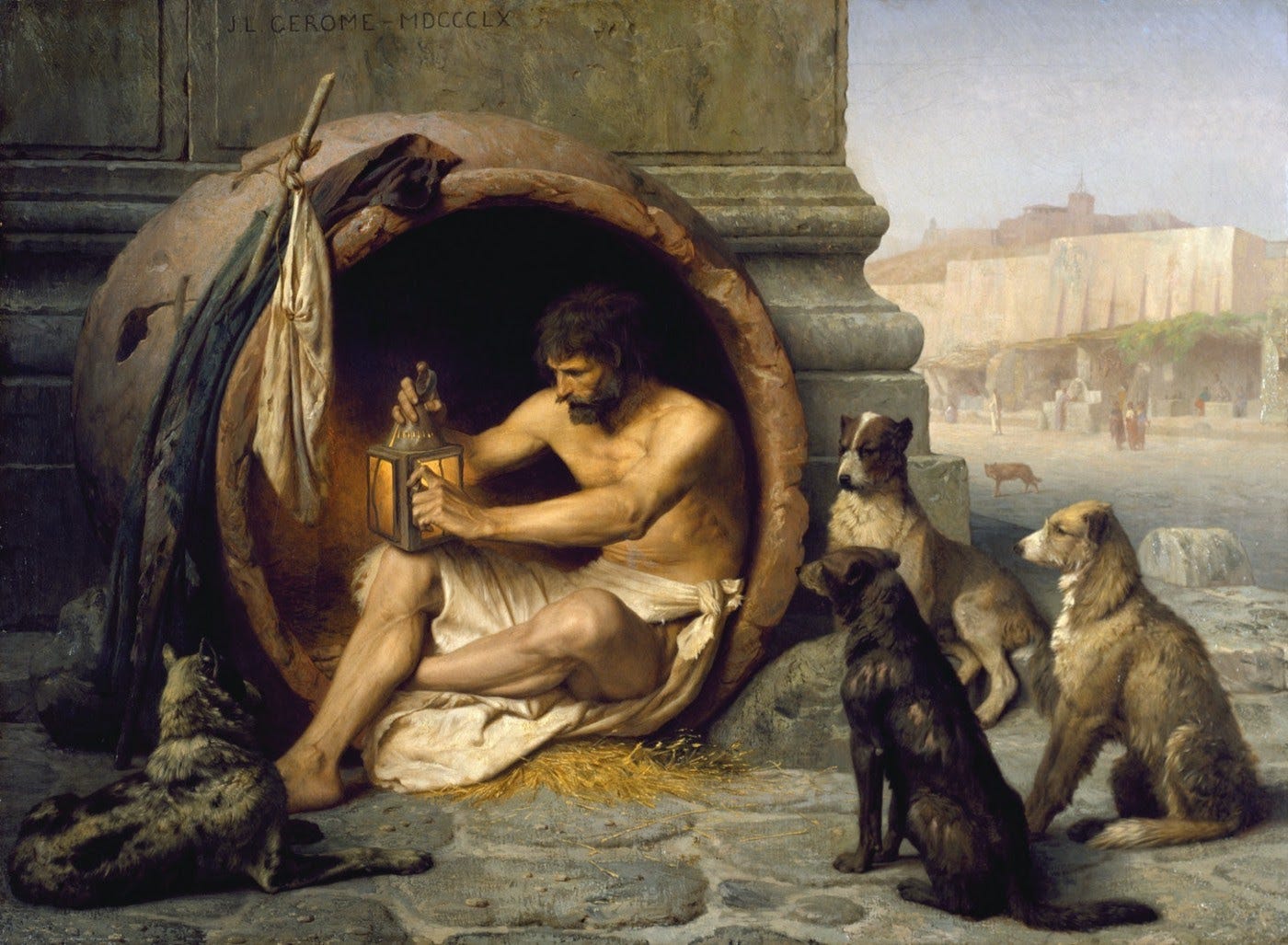The Man in The Tub
As I am about to reach 20 articles published since I started this Substack, I took some time to review a bit of my past writings here, principally to observe what kind of connection (if any) lurks behind these texts. As I was painstakingly going through them—and not without feeling a good dose of cringe on the rudimentary grammar—a strange feeling crept on me: have I become a cynic? But before calling myself names, I thought about reviewing what cynicism is. There’s both a historical and a more contemporary meaning for it.
Cynicism, as a school of thought—and a way of life—originated in ancient Greece. The term itself may have come from the ancient Greek word for dog (Κύων, kýon) or from Cynosarges, a town near Athens where the Cynics had their school. The first Cynic was Antisthenes, originally a pupil of Socrates, but he has been largely overshadowed in history by his student Diogenes of Sinope, who became famous for carrying a lamp in daylight to help him find one honest man, among other extravagant behaviors. Diogenes was for sure a piece of work. But, aren’t we all?
Believing that the individual, and not the organization, was the natural unit of human life, cynics felt that even cherished institutions, such as religion and government, were unnatural and unnecessary—worthy only of scorn. Cynics were openly contemptuous of such institutions and were known for using dramatic and obscene displays to draw people into conversations, in which they could proclaim their views. Humor was the favorite weapon of the Cynics, the privileged and powerful their favorite target. Cynicism was, from the beginning, as much a lifestyle as a philosophy. Cynics wore rough clothing and drank out of their hands so as not to need a cup. Diogenes is even said to have lived in a tub instead of a house. In short, the original Cynics held society's institutions in very low regard and expressed contempt for them in both words and actions. Cynics shunned all possessions, status and wealth and strived to live a life of ascetic simplicity.
Over the centuries the terms "cynic","cynical", and "cynicism" have evolved and taken a place in our language, with meanings that are loosely derived from the tenets of Cynicism. The Oxford English Dictionary defines a cynic as "one who shows a disposition to disbelieve in the sincerity or goodness of human motives and actions, and is wont to express this by sneers and sarcasms; a sneering fault-finder."
The modern version of cynicism is considerably less elevated than its Greek precursor, and highly recognizable. Modern cynics are those who always mistrust everything and everyone. Continuously flagging flaws and yet doing nothing to solve them, contemporary cynics are expert problem spotters while remaining largely uninterested in finding any tangible solution. Note, cynicism is not the same as pessimism. A pessimist is capable of trusting, although he or she always expects unfavorable outcomes; a cynic trusts nothing—is someone who knows the price of everything but the value of nothing1. Nor cynicism should be traded as skepticism—at least the skeptic keeps the mind open.
Why the cynic acts in such manner? Cynicism is a way to cope with what's perceived by the cynic to be an unfriendly, unstable, and insecure world. Cynicism provides a ready and convenient explanation for a perception of continued disillusionment. They blame the 'system' for their disappointments and failings2. For a cynic, life is a battle not between good and bad, but between bad and worse.
There are cynics in almost every organization, and cynicism blooms as a function of scale. Cynic spirits come out as the organization grows—as promotions take place, as hierarchies and policies appear, as a ‘system’ emerges. As soon as such ‘system’ is perceived, the cynic automatically finds a perfect antagonist to continuously fight against. Therefore, they do not care what the ‘system’ has to say—as long as it exists, it must be fought. The true cynic wants the ‘system’ to remain imperfect, so sabotaging it—consciously or unconsciously—is a possible scheme to ensure that.
After reading the stuff written here, some might arrive to the conclusion I might be just another ‘anti-system’ cynic, sitting in a tub and criticizing everything from a safe distance, with no skin in the game.
I guess a tad of cynicism does live in me, which I am absolutely in peace with. As I have written often here, I do tend to loathe elitism, nepotism, cronyism. I enjoy scrutinizing—and at times, mocking—those traveling in organizational “first class” because I am convinced calling out the elites is one valid mechanism to keep them accountable for the immense power they are given. Therefore, I expect, accept and welcome being scrutinized the same way whenever *I* am given such power. I do believe humor is the finest way of societal observation. And finally, I strongly believe in moderation and simplicity as unit vectors of decision making.
But, I try to balance this cynic side of me with a dose of good anti-cynicism. Unlike ancient and modern cynics, I believe in collectivism since there’s always safety in numbers. I don’t fight the ‘system’. I’m positive the ‘system’ can always be made to work. And if it doesn’t work—at least to me—or I conclude I can’t bend its odds, I move on and find another one to work on. Should the day come when I will have zero risks incurred and I will just spout opinions from a tub—in other words, the day I will become a full-time consultant— that day will be the last day of this blog.
###
This definition belongs to Oscar Wilde
https://www.researchgate.net/publication/229636440_Combatting_cynicism_in_the_workplace


